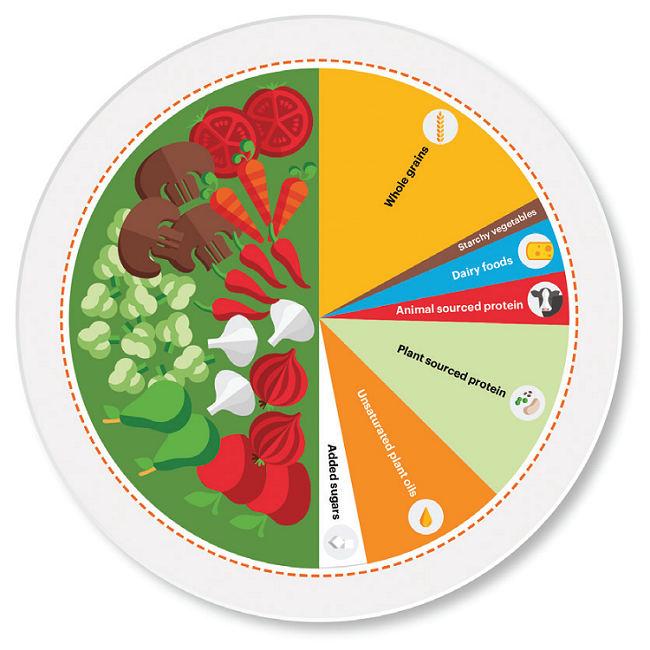FrankTalk What Will We Eat?
Planetary Health Plate
by Frank McCann, CSJP-A
We are reminded daily about the growing threat of climate change, but we hear much less often about the radical revolution required in our global food system. What we eat affects our planet’s health.
We need to reduce greenhouse gases (GHGs) for the planet to survive, and 26% of those gases come from food production and distribution to feed the seven billion inhabitants of Earth.1 Cutting GHGs is complicated by the fact that we need to increase global food production by 50% in order to meet the growing population expected to reach 10 billion persons by the year 2050.2 Per capital food production increased by ten between 1993 and 2013.3 Much of this growth was from expansion of arable land and by the spread of monoculture farming, which while considered “efficient,” leads to soil degradation and loss of biodiversity. We cannot afford to continue cutting forests to create more land for food or burning the Amazon to provide more grazing land for cattle.
Livestock production uses 77% of agricultural land for feed production, pasture and grazing. and provides only 33 percent of dietary protein.4 Using so much arable land for so little protein is demonstrably inefficient. Doctors also say that eating meats at the rate consumed in the US, Australia and most of Europe is both environmentally unsustainable and unhealthy for consumers.
There is an urgent need to move toward a plant-based diet with much smaller, if any, meat-based proteins. EAT (eatforum.org), a nonprofit out of Stockholm dedicated to transforming the global food system, partnered with the medical journal The Lancet (thelancet.com). Together they gathered 37 scientists of multiple disciplines, including human health, agriculture, political science and environmental sustainability from 16 different countries.
They had two particular targets and in January of 2019 the EAT-Lancet Commission published their report outlining how to achieve them.
TARGET 1: A Healthy Diet
“Provide a food plan for a healthy diet to feed 10 billion by the year 2050. Healthy diets have an optimal caloric intake and consist largely of a diversity of plant-based foods, low amounts of animal source foods, contain unsaturated rather than saturated fats, and limited amounts of refined grains, highly processed foods and added sugars.”5
TARGET 2: Sustainable Food Production
“The Commission proposes boundaries that global food production should stay within to decrease the risk of irreversible and potentially catastrophic shifts in the Earth system.”6
The EAT-Lancet Commission Report includes several graphs to understand how diets globally, in North America, Africa and Asia exceed the planetary boundaries set forth in the report. The North American diet (shown at the top of page 23) shows what portions of our diets exceed the planetary boundaries indicated by the dotted orange circle.
The chart clearly shows that North Americans consume significantly more eggs, poultry, starchy vegetables and dairy than is healthy or sustainable. A South Asian diet by contrast, although more balanced than a North American diet, falls short in all categories of food needed for a healthy diet except for starchy vegetables.
Most people who eat meat and fish are not willing to give up all of it. The new “plate” the EAT-Lancet Commission suggests involves one-half of the plate filled with fruits and vegetables. The balance of a 2,500 calorie a day diet would include portions of whole grains, nuts, legumes, oils, dairy, eggs and some small portions of meat or fish, though not necessarily every day.
Among existing diets, a vegan diet is the most environmentally friendly diet followed by a vegetarian diet, which may include animal byproducts such as eggs and dairy. A Mediterranean diet, which often includes smaller amounts of meat and fish, is the next most environmentally friendly.
To reach the UN Sustainable Development Goal #2 of zero hunger by 2030, we need to start making these dietary changes now. Since 2015, the number of persons experiencing food insecurity has been on the rise, and the pandemic is making it worse.
In his recent encyclical Pope Francis writes: “world politics needs to make the effective elimination of hunger one of its foremost and imperative goals… Hunger is criminal; food is an inalienable right.”7 The time to change is now.
Endnotes
1 https://ourworldindata.org/food-ghg-emissions
2 EAT-Lancet Commission Summary Report, “Food Planet Health” p 7. https://eatforum.org/eat-lancet-commission/eat-lancet-commission-summary-report,
3 UN Environmental Program, GEO 6 Global Environmental Outlook: Healthy Planet Healthy People, p 202.
4 Ibid. p 202
5 EAT-Lancet Commission Summary Report, p 10.
6 Ibid., p 15.
7 Francis, Fratelli Tutti, accessed September 11, 2020,
Vatican.va, 189.
Web Resources
Consider making a change, even starting gradually. There are many resources online. Here are a few we like below.
Meatless Mondays is a meat-free guide created by the Sisters of Mercy in an effort to support sustainability. It features 14 sample recipes.
Global non-profit EAT has engaged many of the world’s finest chefs in developing plant-based meals. You can find 15 of their recipes at eatforum.org.
Visit Be Creature Kind for more information on a DefaultVeg diet, making plant-based food the default.
This article appeared in the Spring 2021 issue of Living Peace.

